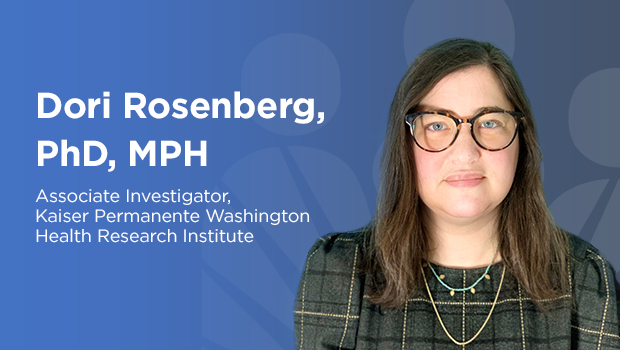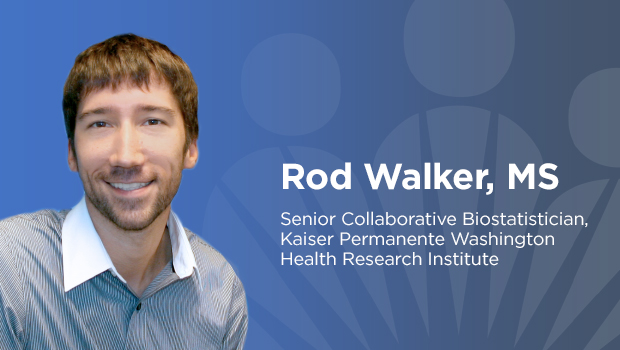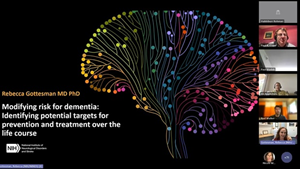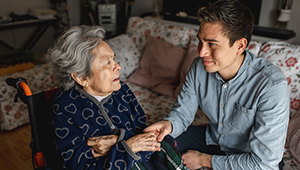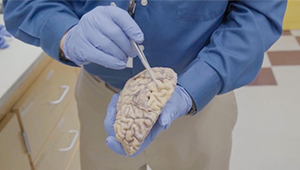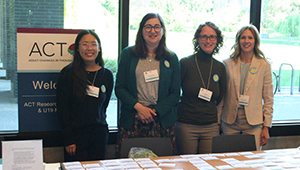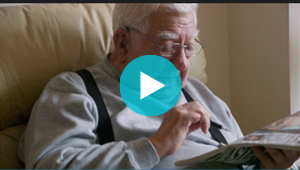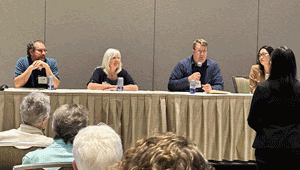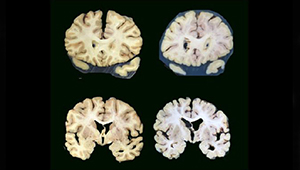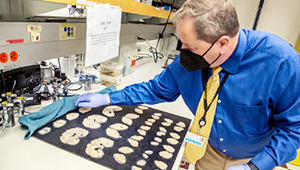Aging & Geriatrics
Research overview
As the world’s population is aging, scientists at Kaiser Permanente Washington Health Research Institute (KPWHRI) are at the forefront of research to help older adults lead healthier lives.
Among the questions KPWHRI scientists have examined include whether getting regular exercise may reduce the risk of dementia, whether widely used medications increase the risk of falls and fractures, how long-term use of opioid pain medications affects the brain, and what approaches can help frail older adults become more physically active. Our research includes studies looking at brain health, physical activity and behavior change, medication safety, cardiovascular health, and chronic disease management, among other research areas. Now, new funding for aging research — especially research on Alzheimer’s and related dementias — offers even greater opportunities for KPWHRI scientists and their colleagues who work in health care systems.
Studies spanning decades
The institute has hosted several long-running cohort studies, including the Adult Changes in Thought (ACT) Study, a collaboration with the University of Washington. For more than 30 years, ACT researchers have studied risk factors for dementia, with the goal of finding new ways to delay or prevent Alzheimer’s disease and cognitive decline.
In May 2021, the National Institute of Aging awarded ACT a new grant totaling $55.6 million. With this additional funding, ACT will further examine how various health factors across our life span can impact later-life heart and brain health. The funding will allow ACT to examine the health impacts of sleep, physical activity, socio-economic factors, and prescription medications, as well as to examine brain imaging. In addition, ACT will continue to collect and study participants’ brains after their deaths to better understand how brain physiology is impacted by lifestyle factors.
Under the 5-year grant, ACT partners are expanding the existing cohort of 2,000 Kaiser Permanente Washington members to 3,000 and implementing new strategies to recruit a more diverse population. Additionally, as part of the grant, the ACT team is making its data more accessible to researchers nationwide. You can find out more about the ACT Study and collaborate with the team at www.actagingresearch.org.
Wide-ranging research
Scientists at KPWHRI are advancing age-related research in many other areas as well. Some highlights:
- The institute’s research on medication safety is contributing to better understanding of how certain medications affect older adults’ well-being and how to avoid unsafe and unnecessary medications. Among other initiatives, KPWHRI researchers are developing a compendium of tools and resources to improve the management of opioids in older adults. Michael Parchman, MD, MPH, is also leading a pilot clinical trial to study the impact of training clinicians to become value champions to reduce inappropriate prescribing for people with dementia.
Additionally, Ben Balderson, PhD, is working with scientists at the University of Washington on 2 grants to test an approach to help older adults reduce or stop risky medications. The researchers are reaching out to primary care doctors and patients with information and education about medications such as opioids, benzodiazepines, and muscle relaxants that may increase the risk of falls, dementia, or other challenges. These studies are set within 18 primary care clinics at Kaiser Permanente Washington.
- In a pilot trial of 172 older adults with risk factors for dementia, researchers at KPWHRI and the University of California, San Francisco (UCSF) are examining whether health coaching to improve physical activity, sleep, and other modifiable risk factors for dementia is an effective way to prevent cognitive decline as people age.
- Dori Rosenberg, PhD, MPH, and colleagues are leading a randomized controlled trial examining whether reducing the amount of time older adults spend sitting can improve their health. In her pilot studies, she showed that helping older adults to sit less (by encouraging more standing and moving) fit into their daily lives more easily than focusing only on promoting structured bouts of exercise.
- Sascha Dublin, MD, MPH, is leading work to promote earlier recognition and diagnosis of dementia. Together with researchers at UCSF, she and her team developed the eRADAR risk score, which uses routine data from electronic health records to identify people at higher risk of having undiagnosed dementia. Now, with funding from the National Institute on Aging, they are conducting a randomized clinical trial to test the impact of applying this model and reaching out to high-risk patients in 8 primary care clinics at Kaiser Permanente Washington and UCSF.
- Robert Penfold, PhD, is leading a pragmatic randomized trial to develop and test STAR-VTF, a training program to support caregivers of people with dementia and reduce the use of antipsychotic medications among these patients. The program was originally created by colleagues at the University of Washington and has now been adapted to provide online training and virtual visits.
- Marlaine Figueroa Gray, PhD, is collaborating with scientists at the University of Toronto and on the ACT Study to examine the lived experiences of older adults with cognitive subtypes of dementia and the perspectives of those who care for them. She has also partnered on projects to determine health outcomes of kinless elders living with dementia, to examine the experience of people living with advanced dementia who receive specialty palliative care, and to understand the perspectives of patients, families, and providers on a screening tool that would provide information on the risk of living with undiagnosed dementia.
- The cancer screening work by Karen Wernli, PhD, and Ellen O’Meara, PhD, has underscored the need for more research into when the benefits of screenings for breast and lung cancers are worth the risks for older adults, particularly people with other serious illnesses.
- The Chronic Care Model — developed at KPWHRI’s Center for Accelerating Care Transformation (formerly known as the MacColl Center for Health Care Innovation) — is widely recognized as the leading care-design model for everyone, including older people, with chronic disease.
- In addition to the institute’s work promoting healthier aging, KPWHRI scientists — through the ACT Study, its predecessors, and other research — have contributed to the growing movement to support and improve caregiving, especially for people living with dementia. Our investigators are also seeking ways to help older adults receive late-life care that best reflects their values and preferences.
Recent publications on Aging & Geriatrics
Manson JE, Chlebowski RT, Stefanick ML, Aragaki AK, Rossouw JE, Prentice RL, Anderson G, Howard BV, Thomson CA, LaCroix AZ, Wactawski-Wende J, Jackson RD, Limacher M, Margolis KL, Wassertheil-Smoller S, Beresford SA, Cauley JA, Eaton CB, Gass M, Hsia J, Johnson KC, Kooperberg C, Kuller LH, Lewis CE, Liu S, Martin LW, Ockene JK, O'Sullivan MJ, Powell LH, Simon MS, Van Horn L, Vitolins MZ, Wallace RB. Menopausal hormone therapy and health outcomes during the intervention and extended poststopping phases of the Women's Health Initiative randomized trials. JAMA. 2013;310(13):1353-68. doi: 10.1001/jama.2013.278040. PubMed
Rustagi AS, Kamineni A, Weiss NS. Response to counterpoint: efficacy of cervical cancer screening in older women. Am J Epidemiol. 2013;178(7):1027. doi: 10.1093/aje/kwt166. Epub 2013 Aug 21. PubMed
Rustagi AS, Kamineni A, Weiss NS. Point: cervical cancer screening guidelines should consider observational data on screening efficacy in older women. Am J Epidemiol. 2013 Oct 1;178(7):1020-2. doi: 10.1093/aje/kwt167. Epub 2013 Aug 21. PubMed
Newton KM, Reed SD, Guthrie KA, Sherman KJ, Booth-LaForce C, Caan B, Sternfeld B, Carpenter JS, Learman LA, Freeman EW, Cohen LS, Joffe H, Anderson GL, Larson JC, Ensrud KE, LaCroix AZ. Efficacy of yoga for vasomotor symptoms: a randomized controlled trial. Menopause. 2014 Apr;21(4):339-46. doi: 10.1097/GME.0b013e31829e4baa. PubMed
Stevens JA, Phelan EA. Development of STEADI: a fall prevention resource for health care providers. Health Promot Pract. 2013 Sep;14(5):706-14. doi: 10.1177/1524839912463576. Epub 2012 Nov 16. PubMed
Researchers in Aging & Geriatrics
 Sascha Dublin, MD, PhDSenior Investigator |
 Dori E. Rosenberg, PhD, MPHSenior Investigator |
 Erin J. Bowles, MPHDirector, Collaborative Science |
 Melissa L. Anderson, MSPrincipal Collaborative Biostatistician |
 Rod L. Walker, MSPrincipal Collaborative Biostatistician |
 Laura Harrington, PhD, MPHAssociate Investigator |
 Robert Penfold, PhDSenior Investigator |
 Marlaine Figueroa Gray, PhDAssistant Investigator |
 Ben Balderson, PhDSenior Collaborative Scientist |
 Jennifer C. Nelson, PhDDirector, Biostatistics; Senior Investigator |
 Onchee Yu, MSPrincipal Collaborative Biostatistician |
 Jessica Chubak, PhDSenior Investigator |
 Yu-Ru Su, PhDAssociate Biostatistics Investigator |
 Chloe Krakauer, PhDCollaborative Biostatistician |
 Karen Wernli, PhDSenior Investigator |
 Mikael Anne Greenwood-Hickman, MPHSenior Collaborative Scientist |
 Brian D. Williamson, PhDAssistant Biostatistics Investigator |
 Pamela A. Shaw, PhD, MSSenior Biostatistics Investigator |
 Nicole M. Gatto, PhD, MPHPrincipal Collaborative Scientist |
 Linda K. McEvoy, PhDSenior Investigator |
 Lily N. Shapiro, PhDCollaborative Scientist |
Affiliate researchers
James Bowen, MD
Neurologist
Swedish Medical Center
Paul Crane, MD, MPH
Professor, Internal Medicine
University of Washington
David R. Crosslin, PhD
Assistant Professor
Biomedical Informatics and Medical Education
Adjunct Faculty
Genome Sciences, Division of Medical Genetics
University of Washington
Kristen Dams-O'Connor, PhD
Associate Professor
Department of Rehabilitation Medicine
Icahn School of Medicine at Mt. Sinai
James Floyd, MD, MS
Assistant Professor, Department of Medicine
Shelly Gray, PharmD, MS, AGSF
Professor, Department of Pharmacy
University of Washington
Gail Jarvik, MD, PhD
Professor, Medical Genetics, Genome Sciences, Department of Medicine
University of Washington
Dirk Keene, MD, PhD
Department of Pathology
Harborview Medical Center
Zachary A. Marcum, PhD, PharmD
Assistant Professor, School of Pharmacy
University of Washington
Wayne McCormick, MD, MPH
Head of Gerontology and Geriatric Medicine
UW Medicine
Sue McCurry, PhD
Research Professor, Psychosocial and Community Health
University of Washington
Elizabeth Phelan, MD, MS
Associate Professor, Medicine/Gerontology and Geriatric Medicine
Harborview Medical Center
Adjunct Associate Professor, Health Services
University of Washington
Janelle S. Taylor, PhD
Professor, Department of Anthropology
University of Toronto
Linda Teri, PhD
Professor, Psychosocial & Community Health
Director, Northwest Research Group on Aging, Psychosocial and Community Health
University of Washington
Oleg Zaslavsky, PhD, MHA, RN
Assistant Professor Biobehavioral Nursing and Health Systems Department
Associate Director of Research, de Tornyay Center for Health Aging
School of Nursing, University of Washington


